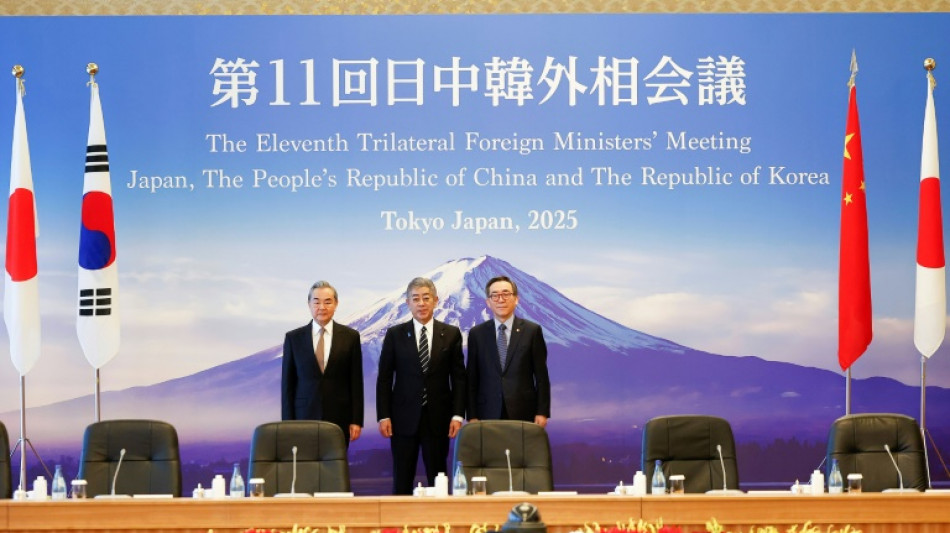
-
 At least 24 killed in Kashmir attack on tourists: Indian police source
At least 24 killed in Kashmir attack on tourists: Indian police source
-
Philippine typhoon victims remember day Pope Francis brought hope
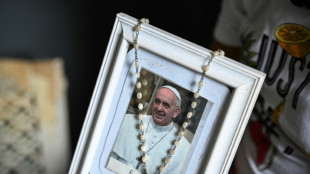
-
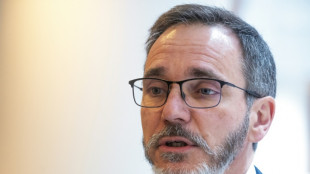 IMF slashes global growth outlook on impact of Trump tariffs
IMF slashes global growth outlook on impact of Trump tariffs
-
BASF exits Xinjiang ventures after Uyghur abuse reports

-
 Nordics, Lithuania plan joint purchase of combat vehicles
Nordics, Lithuania plan joint purchase of combat vehicles
-
Gold hits record, stocks diverge as Trump fuels Fed fears
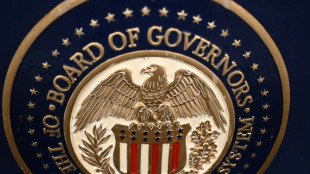
-
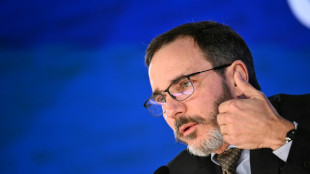 World could boost growth by reducing trade doubt: IMF chief economist
World could boost growth by reducing trade doubt: IMF chief economist
-
IMF slashes global growth outlook on impact of US tariffs

-
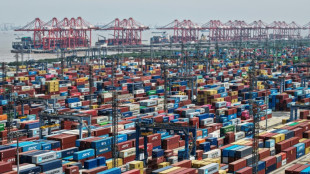 IMF slashes China growth forecasts as trade war deepens
IMF slashes China growth forecasts as trade war deepens
-
Skipper Shanto leads Bangladesh fightback in Zimbabwe Test

-
 US VP Vance says 'progress' in India trade talks
US VP Vance says 'progress' in India trade talks
-
Ex-England star Youngs to retire from rugby

-
 Black Ferns star Woodman-Wickliffe returning for World Cup
Black Ferns star Woodman-Wickliffe returning for World Cup
-
Kremlin warns against rushing Ukraine talks
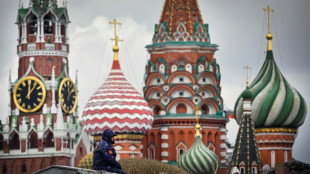
-
 Mbappe aiming for Copa del Rey final return: Ancelotti
Mbappe aiming for Copa del Rey final return: Ancelotti
-
US universities issue letter condemning Trump's 'political interference'

-
 Pope Francis's unfulfilled wish: declaring PNG's first saint
Pope Francis's unfulfilled wish: declaring PNG's first saint
-
Myanmar rebels prepare to hand key city back to junta, China says

-
 Hamas team heads to Cairo for Gaza talks as Israel strikes kill 26
Hamas team heads to Cairo for Gaza talks as Israel strikes kill 26
-
Pianist to perform London musical marathon

-
 India's Bumrah, Mandhana win top Wisden cricket awards
India's Bumrah, Mandhana win top Wisden cricket awards
-
Zurab Tsereteli, whose monumental works won over Russian elites, dies aged 91
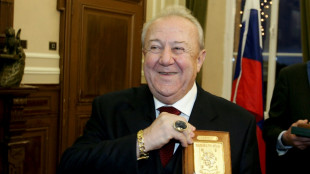
-
 Roche says will invest $50 bn in US, as tariff war uncertainty swells
Roche says will invest $50 bn in US, as tariff war uncertainty swells
-
Pope Francis's funeral set for Saturday, world leaders expected

-
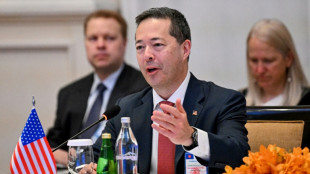 US official asserts Trump's agenda in tariff-hit Southeast Asia
US official asserts Trump's agenda in tariff-hit Southeast Asia
-
World leaders set to attend Francis's funeral as cardinals gather

-
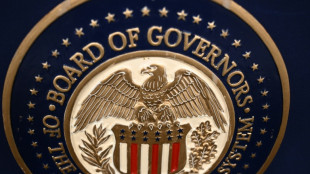 Gold hits record, stocks mixed as Trump fuels Fed fears
Gold hits record, stocks mixed as Trump fuels Fed fears
-
Roche says will invest $50 bn in US over next five years

-
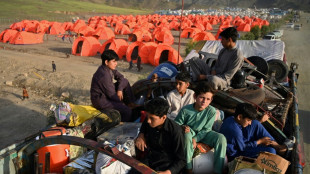 Fleeing Pakistan, Afghans rebuild from nothing
Fleeing Pakistan, Afghans rebuild from nothing
-
US Supreme Court to hear case against LGBTQ books in schools

-
 Pistons snap NBA playoff skid, vintage Leonard leads Clippers
Pistons snap NBA playoff skid, vintage Leonard leads Clippers
-
Migrants mourn pope who fought for their rights

-
 Duplantis kicks off Diamond League amid Johnson-led changing landscape
Duplantis kicks off Diamond League amid Johnson-led changing landscape
-
Taliban change tune towards Afghan heritage sites
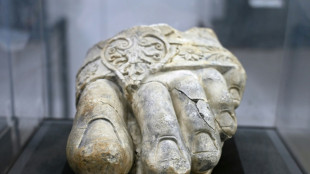
-
 Kosovo's 'hidden Catholics' baptised as Pope Francis mourned
Kosovo's 'hidden Catholics' baptised as Pope Francis mourned
-
Global warming is a security threat and armies must adapt: experts

-
 Can Europe's richest family turn Paris into a city of football rivals?
Can Europe's richest family turn Paris into a city of football rivals?
-
Climate campaigners praise a cool pope

-
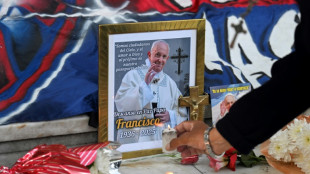 As world mourns, cardinals prepare pope's funeral
As world mourns, cardinals prepare pope's funeral
-
US to impose new duties on solar imports from Southeast Asia

-
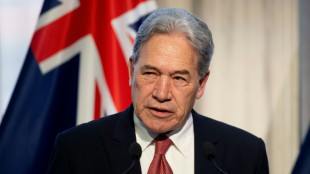 Draft NZ law seeks 'biological' definition of man, woman
Draft NZ law seeks 'biological' definition of man, woman
-
Auto Shanghai to showcase electric competition at sector's new frontier

-
 Tentative tree planting 'decades overdue' in sweltering Athens
Tentative tree planting 'decades overdue' in sweltering Athens
-
Indonesia food plan risks 'world's largest' deforestation

-
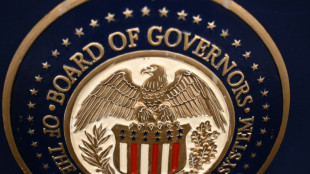 Gold hits record, stocks slip as Trump fuels Fed fears
Gold hits record, stocks slip as Trump fuels Fed fears
-
Trump helps enflame anti-LGBTQ feeling from Hungary to Romania

-
 Woe is the pinata, a casualty of Trump trade war
Woe is the pinata, a casualty of Trump trade war
-
'Like orphans': Argentina mourns loss of papal son

-
 Trump tariffs torch chances of meeting with China's Xi
Trump tariffs torch chances of meeting with China's Xi
-
X rival Bluesky adds blue checks for trusted accounts


Japan, China, and South Korea agree to promote peace, cooperation
Japan, South Korea and China agreed Saturday that peace on the Korean peninsula was a shared responsibility, Seoul's foreign minister said, in a meeting of the three countries' top diplomats in which they pledged to promote cooperation.
The talks followed a rare trilateral summit in May in Seoul where the neighbours -- riven by historical and territorial disputes -- agreed to deepen ties and restated their goal of a denuclearised Korean peninsula.
But they come as US trade tariffs loom over the region, and as concerns mount over North Korea's weapons tests and its deployment of troops to support Russia's war against Ukraine.
"We reaffirmed that maintaining peace and stability on the Korean peninsula is a shared interest and responsibility of the three countries," South Korea's Cho Tae-yul said Saturday.
"Additionally, I stressed that illegal military cooperation between Russia and North Korea must be immediately halted," he said.
Seoul and Tokyo typically take a stronger line against North Korea than China, which remains one of Pyongyang's most important allies and economic benefactors.
Japanese Foreign Minister Takeshi Iwaya said he, Cho, and China's Wang Yi "had a frank exchange of views on trilateral cooperation and regional international affairs... and confirmed that we will promote future-orientated cooperation".
"The international situation has become increasingly severe, and it is no exaggeration to say that we are at a turning point in history," Iwaya said at the start of Saturday's meeting.
"In this context, it has become more important than ever to make efforts to overcome division and confrontation through dialogue and cooperation", he said.
Wang said that this year marks the 80th anniversary of the end of World War II, and "only by sincerely reflecting on history can we better build the future".
Strengthening cooperation will allow the countries "to jointly resist risks" as well as promote "mutual understanding" between their populations, he added.
- New economic opportunities -
Ukraine was also on the agenda Saturday, with Iwaya warning that unilaterally changing the status quo by force was unacceptable anywhere.
"On the situation in Ukraine, I emphasised the need for the international community to unite in calling out that any attempt to unilaterally change the status quo by force will not be tolerated anywhere in the world," he told reporters.
Climate change, ageing populations and trade were among the broad topics officials had said would be discussed on Saturday, as well as working together on disaster relief and science and technology.
China and to a lesser extent South Korea and Japan have been hit by tariffs put in place by US President Donald Trump in recent weeks, but none of the ministers addressed the issue directly in their statements to the press.
Iwaya said the trio had "agreed to accelerate coordination for the next summit" between the countries' leaders.
The foreign minister will also hold bilateral talks with both counterparts Saturday, while Japan and China will have their first so-called "high-level economic dialogue" in six years.
Patricia M. Kim, a foreign policy fellow at the Brookings Institution in Washington, said that while "trilateral dialogues have been ongoing for over a decade", this round "carries heightened significance" due to the new US position.
"Their leaders are under growing pressure to diversify their options and to seek alternative economic opportunities," she told AFP.
Beijing "has been working actively to improve relations with other major and middle powers amid growing frictions with the United States", she added.
H.Gerber--VB
